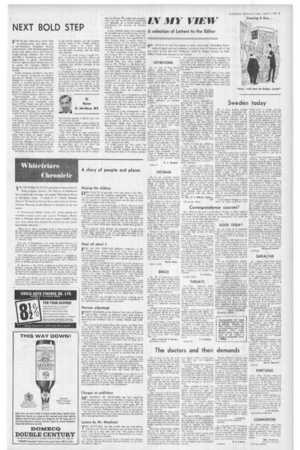Page 5, 9th April 1965
Page 5

Report an error
Noticed an error on this page?If you've noticed an error in this article please click here to report it.
Tags
Share
Related articles
Rome Talks Pave Way For Papal Visit To Britain
Opponents Of Mgr Kent
Two Techniques To Get People Singing In Church
Norman The Confessor
The End Of A Session
NEXT BOLD STEP
By Norman St. John-Stevas, M.P.
FOR the past three days I have been at Konigswinter, near Bonn. with a parliamentary delegation holding conversations with German parliamentarians and others about the future of Anglo-German relations. The visit has provided a fascinating and rewarding opportunity to gauge contemporary German opinion about Britain and also to assess the German attitude to France and in particular to General de Gaulle. Today Germany occupies a key position in Europe, wooed by the General and also by Britain. It is an astonishing change for a country excluded from the comity of civilised nations less than 20 years ago. Chief credit for this transformation of Germany's position must go to France, and an understanding of this factor is essential for a realistic assessment .of Franco-German relations today. Psychologically the Germans are deeply grateful to General de Gaulle for having made them respectable once again. While Britain was still indulging in anti-German prejudices De Gaulle was busy promoting the reconciliation of France and Germany. the axis round which the future of Europe must revolve. Economically Germany has everything to lose and very little to gain by a breach with France. The break-up of the Common Market would seriously threaten the stability of the German economy and bring to an end the present unprecedented prosperity of the German people. These two facts explain why in every clash with France in recent months— whether over the M.L.F., the A.N.F., or agricultural policy—the Germans have given way. Whether it has been pigs or bombs. the Germans have not been disposed to break with the General and it has not been in their interests to do so.
Yet there are limits to German loyalty
to the French alliance, and the German sticking point is the Atlantic alliance. Whatever General de Gaulle may threaten, however much he may cajole and persuade. Germany will not break with America. I have not come across a single German—in private or in public—who is not keenly aware that the security of the Federal Republic depends on the nuclear capability and military strength of the United States. This attitude is of crucial importance in developing the lines of British policy towards Europe in the immediate future. In recent months English Gaullists have sprung up in all parts—but especially the Tory party—who argue that the only way for Britain to get into Europe is for Britain to loosen her ties with the United States, to do a nuclear deal with De Gaulle, and in return to earn a favour.
able French attitude to British entry into the Common Market.
I have never thought such a policy for Britain anything but a chimera. After my visit to Germany I am convinced that that is exactly what it is. The only effect of such manoeuvres would be to break the Anglo-American alliance, to earn us the distrust of the Germans and the other friendly members of the Common Market, while giving us no guarantee that in the event the General would deliver the goods. In any case. entry to the Common Market on such terms would he intolcr able for Britain. tVe might gain economically, hut only at the price of stultifying our influence as a world power and jeopardising the security of Western Europe.
A more fruitful policy is to accept that the Gaullist veto excludes us from Europe at the moment but to make every preparation to seize the next opportunity to enter Europe when it occurs, which it undoubtedly will. In this respect nothing is more important than to clarify to the Germans and the other E.E.C. partners our attitude to the Common Market. A clear declaration from the Labour Government that it intends to sign the Treaty of Rome as soon as the opportunity presents itself would transform the situation. This, alas, seems unlikely as s long as Mr. Wilson, a convinced antiEuropean, heads the present government. Failing a government declaration, the next best thing would be a declaration from the Opposition that it was the intention of the Conservative party as soon as it returns to power to take the first opportunity of applying for Common Market membership. Meanwhile, policies should be worked out for Commonwealth trade and British agriculture which would make the transition as smooth as possible. I believe that such a declaration would not only benefit our position abroad but would be an electoral winner at home. It would range the Tory party on the side of all those in Britain who are looking to the future rather than clinging nostalgically to the past. It would he a key development in the emergence of the Tory party as a progressive alternative to the existing government. It could form the basis of an intense effort to inform the country of the choices which must be made if Britain is to survive in the modern world. Such a decision would take courage. but courage and leadership are precisely what the country needs today. No great political advance has ever been possible in Britain without trusting and informing the people, and what has been true of the past is equally true today. It would benefit the Tory party, but that is incidental. What is vital is to ensure that the country takes the next step along the road of its historic destiny.
blog comments powered by Disqus











